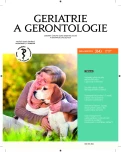-
Medical journals
- Career
Demographic changes in Europe and their influence on development and traffic planning.
Authors: K. Schmeidler
Published in: Geriatrie a Gerontologie 2015, 4, č. 3: 144-148
Category: Review Article
Overview
In the short time of 20 years, we can expect a completely different approach to life by the elderly population of that day. It will be to a large part composed of educated and emancipated citizens, used to high levels of mobility. Most of them will have a driving license and they will expect to be enabled to continue to drive even in advanced age. Alternative modes of transport will need to be selected to fit the needs and preferences of the upcoming generation of seniors, especially those reaching 80 years of age or more. Future transport systems will play a significant role in their lifestyle, sense of independence and healthy life.
Keywords:
inclusive mobility - transport - accessibility - ageing - elderly - urban society - quality of life
Labels
Geriatrics General practitioner for adults Orthopaedic prosthetics
Article was published inGeriatrics and Gerontology

2015 Issue 3-
All articles in this issue
- Social robots in the era of demographic ageing (and gnomographic uncertainty
- Demographic changes in Europe and their influence on development and traffic planning.
- The Best Practice Statement is a key objective of the Erasmus+ Dementia Palliare project
-
Case management and its applications in residential social services
(experiences from the Vážka® certification) - Editorial
- Results of the pilot study: Informal care for dementia patients
- Effects of Core Instability Strength Training with Swiss Ball on Postural Stability in Elderly Women
- Sexuality in older adults with treated arterial hypertension and education performed by health Professional
- Cardiovascular diseaseage-related androgen deficiency in male population
- Geriatrics and Gerontology
- Journal archive
- Current issue
- Online only
- About the journal
Most read in this issue- Results of the pilot study: Informal care for dementia patients
- Effects of Core Instability Strength Training with Swiss Ball on Postural Stability in Elderly Women
- Social robots in the era of demographic ageing (and gnomographic uncertainty
- The Best Practice Statement is a key objective of the Erasmus+ Dementia Palliare project
Login#ADS_BOTTOM_SCRIPTS#Forgotten passwordEnter the email address that you registered with. We will send you instructions on how to set a new password.
- Career

